The Viking Queen (1967)
Directed by: Don Chaffey
Written by: Clarke Reynolds, John Temple-Smith
Starring: Andrew Keir, Carita Järvinen, Don Murray, Donald Houston
UK
AVAILABLE ON DVD
RUNNING TIME: 91 min
REVIEWED BY: Dr Lenera, Official HCF Critic
1st century Britain: a time when the country was divided up into numerous kingdoms, all ruled in collaboration with the occupying forces of the Roman army. Icena’s king dies but not before he’s nominated one of his two daughters Salina to succeed him – but only if she shares the rule with Justinian, a Roman but one who is fair and just. Salina and Justinian fall in love, but make enemies of a group of hard-line Romans led by Octavian who feels that the Briton’s are being indulged by the soft approach of Justinian, and the Druids led by Maelgan, a zealot who thirsts for power and wishes to rid Britain of its Roman overlords….
Salina’s father may say to her at the beginning, “like your mother you shall be called The Viking Queen”, but there aren’t actually any Vikings in this film, which is the sole Hammer picture set further back in history than the Middle Ages aside from their prehistoric films. Why they didn’t just call it Boadicea I don’t know, as it derives so much from her story as well as taking some bits from Vincenzo Bellini’s opera Norma. Then again, this is a film which has British Druids worship a god called Zeus [!] and torture and sacrifice victims, though otherwise it does try to give a reasonable sense of time and place, and its screenplay by Clarke Reynolds is surprisingly involved. Too involved, perhaps, for a film that only runs an hour and a half. It’s really quite a compelling, if surprisingly grim, tale, but some of it does seem rushed. Take a scene near the end where the two former lovers reunite briefly even though they’re now on opposite sides. It’s over far too quickly which means we don’t feel as involved and even moved as we should be, though to be fair the shoddy performance by Don Murray doesn’t help much either. The much criticised Carita [full name Carita Järvinen] really isn’t too bad though despite her think Finnish accent, and it’s a shame this was her only film [though she claimed that she turned down two roles in James Bond films].
The slightly larger budget than normal allows for some scenes with lots of extras, though the battle scenes are mostly brief and the major set piece of the Celtic chariots with scythes on the wheels cutting down loads of Roman soldiers isn’t too convincing despite some use made of shaky POV camera work. The Romans are obviously standing in place while the blades mow them down. Still, there’s a considerable amount of mounting suspense as the Romans get progressively nastier and you’re waiting for Salina to start fighting back. There’s also quite a bit of ‘PG’-level brutality, scenes involving a group of people being burned in a cage and Salina being flogged having to be cut down in 1967. It also amusingly comes as close to nudity as possible without showing the real thing, with the good old “side boob” shot, plus conveniently placed objects, hands and even pasties being used to cover naughty parts. Austin Powers would have approved. In a story in which many of its characters seem to be comprised of both good and bad, Andrew Keir was probably never nastier as Octavian: fascist, rapist and without seemingly a shred of humanity, though he shares many of his scenes with a character credited as the ‘Nubian girl slave’ whose constant changes of costume draw attention to the fact that she’s obviously played by a white woman. Meanwhile Donald Houston camps it up something rotten as Maelgan in a film which has rather a lot of acting styles. Set almost entirely outdoors in lushly photographed Irish countryside, The Viking Queen does have a fair bit to recommend it, even if it falls rather short of its ambitions.

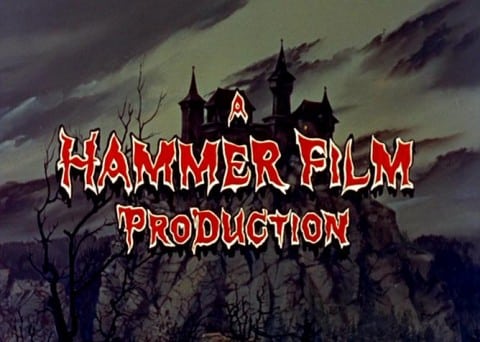
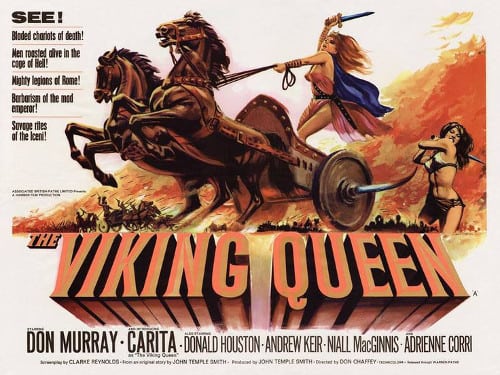
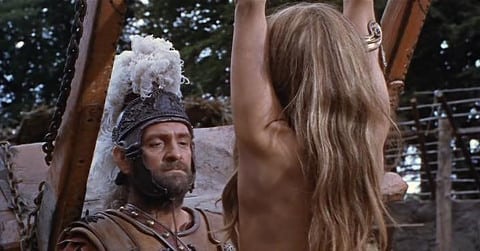



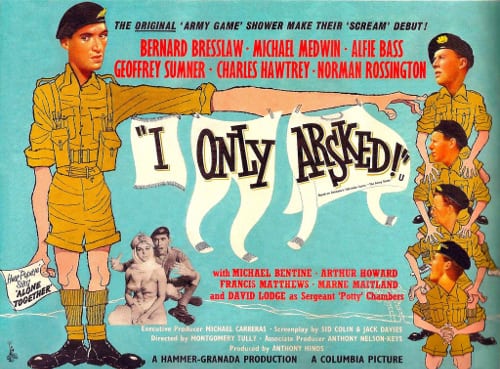
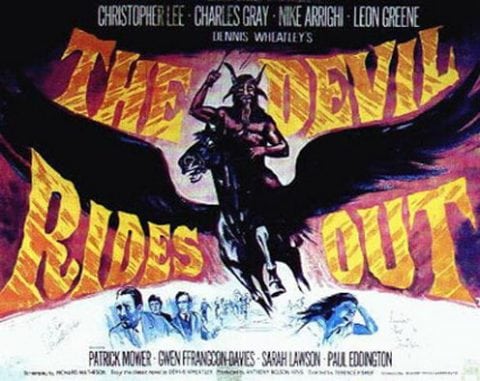
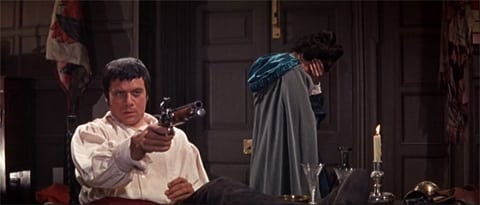
Well it’s not meant to be taken seriously. Think of it as taking inspiration from Shakespeare’s Romeo and Juliet with Othello, add in the Romans vs the barbarians, some nudity and you have a fun Hammer Films romp. 7.7/10.